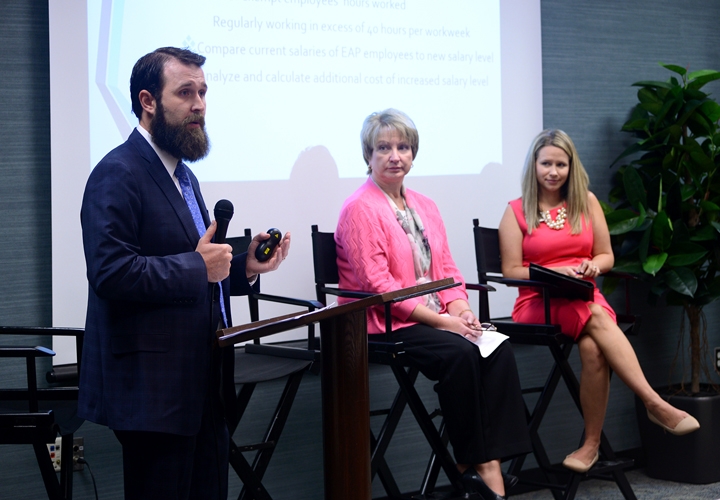DOL overtime rule change requires significant planning

The Department of Labor’s new rule on overtime pay for salaried employees has created a lot of uncertainty for southwest Missouri employers—including which employees will be affected, how to bring those employees into compliance, how to communicate the changes to those employees and how to properly account for the new rules.
The uncertainty was apparent at the Chamber’s 60 Minutes to Success session on August 10. Nearly 90 businesspeople attended, making it one of the most popular sessions in the series—so popular that attendees stayed an extra 30 minutes to ask questions of the panelists.
 While the new regulations cover more than 500 pages, most employers are concerned about one key change: The salary threshold above which employees can be exempted from overtime pay will more than double, from $23,660 per year to more than $47,000.
While the new regulations cover more than 500 pages, most employers are concerned about one key change: The salary threshold above which employees can be exempted from overtime pay will more than double, from $23,660 per year to more than $47,000.
Attendees heard from Travis Elliott, attorney with Ellis, Ellis, Hammons & Johnson PC; Patty Dixon, human resources manager with CSI; and Krystal Russell, partner with Payroll Vault. The three panelists offered several recommendations for companies looking to deal with the new rules:
- Companies should develop an action plan as soon as possible to check for compliance issues. Attorney Elliott says companies should take several steps, including identifying which employees are currently exempt, auditing those employees’ hours and analyzing the costs of increasing those employees salary vs. offering overtime.
- Consider the consequences of reclassifying employees from exempt to nonexempt. These include scheduling issues, reconsideration of work duties, calculating how much overtime to pay and the potential impact on employee morale of being converted to hourly pay.
- Review employee job descriptions. Dixon says making sure employees are classified correctly is crucial, and companies should plan to provide training – both to individual employees and HR personnel – on how job duties and responsibilities might change.
- Develop a plan for communicating the changes. Dixon points to the fact that changes could create employee anxiety, so communication should be open, honest and face-to-face whenever possible.
- Review and, if necessary, revise company policies and practices. Russell points out that companies could run into potential pitfalls when dealing with issues like timekeeping, off-the-clock work that could run afoul of the overtime regulations and potential compensation issues related to meals, rest periods and travel.

